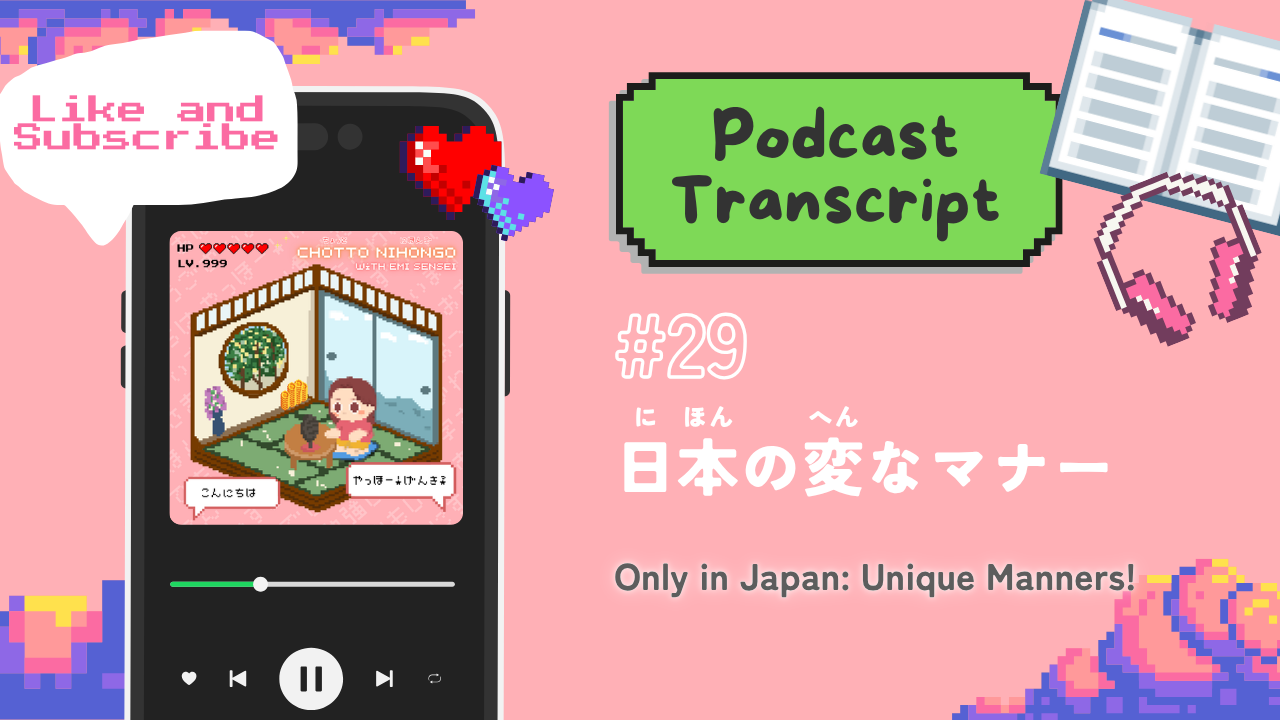おすすめの Google 拡張機能です!新しい言葉を勉強しましょう!
Here are the recommended Chrome extensions! Let’s learn new words here!
ポッドキャストプラットフォーム|Platforms of Podcast
こちらの記事は、配信中のポッドキャストのスクリプトです。
ぜひ、ポッドキャストを聞きながら読んでください。
 えみ先生
えみ先生もう聞いた人は、クイズをチェックしましょう!
ちょっとクイズ!|CHOTTO Quiz!
ポッドキャストを聞いた人は、ちょっとクイズを解いてみましょう。
むずかしいときは、下のスクリプトを読んで、もう一度クイズをチェックしてみてください。
【えいご】English Translation
Answer these quiz questions if you’ve listened to a new episode of my podcast.
If it was difficult, read the transcript below and try again.
❓ 沖縄の夏の天気は どうですか?|How’s the Summer weather in Okinawa?
むしあつくて、汗をかきます。
It is humid, and people get sweaty.
❓ 日本では、ご飯をたべるときに お茶わんをどうしますか?|What do people in Japan do with their rice bowls when eating?
お茶わんを手に持って 食べます。
They hold the rice bowl in their hands while eating.
❓ 電車の中で やってはいけないことは なんですか?|What are people not supposed to do on the train?
電話をしたり、音を出して 動画を 見たりすることです。
Talking on the phone or watching videos with sound (is considered bad manners).
ポッドキャストのスクリプト|Transcript of Podcast
エピソード29、「日本の変なマナー」
このポッドキャストは、初中級(Pre-Intermediate)レベルです。
おはようございます。こんにちは。こんばんは。
日本語の先生、エミです。
今、私は 地元の沖縄に 帰ってきています。
みなさん、沖縄に来たことがありますか?
沖縄は、一年中 あたたかい地域です。
冬は雪が降りません。そして今の季節、夏は暑いです。
でも、夏は日本はどこでも あついです。
沖縄は むしあついです。
むしあついは、Humid.
むしあついですから、汗をかいて ベタベタします。
【えいご】English Translation
Good morning. Hello. Good afternoon.
I am a Japanese teacher, Emi.
Right now, I’m back in my hometown, Okinawa.
Have you ever been to Okinawa?
Okinawa is a warm region all year round.
It doesn’t snow in winter. And during this season, summer, it’s hot.
But in Japan, it’s hot everywhere during summer.
Okinawa is humid.
“Mushiatsui“ means humid (in English).
Because it’s humid, you get sweaty and sticky.
今も 私は すこし汗をかいています。
むしあついですけど、沖縄は家族もいるし、友達も たくさんいるので楽しいです。
むかし、ポッドキャストで沖縄の話をしたことがあります。
エピソード5です。興味がある人はぜひ聞いてみてください。
【えいご】English Translation
I’m sweating a little right now, too.
Even though it’s hot and humid, I enjoy being in Okinawa because my family and many friends are here.
I talked about Okinawa in a past podcast episode.
It’s Episode 5. If you’re interested, please listen to it.
ここで先週の質問をチェックしましょう。
先週は こんな質問をしました。
「日本で びっくりしたマナーはありますか?」
こんな質問でした。
【えいご】English Translation
Alright, now let’s check last week’s question.
Last week, I asked this question:
“Did anything about Japanese manners surprise you?”
That was the question.
日本は、ほかの国より ルールやマナーが多いかもしれません。
そして、日本人は しずかな人が多いので、人がたくさんいる場所は 特にルールが たくさんあると思います。
今日は日本のマナーについて、4つのカテゴリーにわけて話します。
【えいご】English Translation
Japan might have more rules and manners than other countries.
Also, because many Japanese people are quiet, I think there are especially many rules in crowded places.
Today, I will talk about Japanese manners in four categories.
まずは、食べるときのマナーについてです。
日本は、ご飯を食べるときに お箸を使いますね。
そして、ご飯はお茶わんに入っています。お茶わんはBowlです。
味噌汁もお茶わんに入っています。
そして、魚とか肉とか おかず、メインディッシュは お皿に入っています。
【えいご】English Translation
First, table manners.
In Japan, we use chopsticks when we eat.
And rice is served in a bowl called “ochawan.”
Miso soup is also served in an ochawan.
Fish, meat, or side dishes or main dishes are served on plates.
日本では、お茶わんや 小さい皿を 手に持って食べます。
たとえば、ご飯のお茶わんや 味噌汁のお茶わんは持ちます。
日本の食べ物は、ほとんど箸で食べますよね。
そして、むかし、日本の家は たたみの床が多かったです。
Tatatmi mat.
今は、たたみじゃない家も 増えています。
でも、日本人は たたみを大事にしていたので、傷がつかないように テーブルを置かない家も多かったそうです。
【えいご】English Translation
In Japan, people hold bowls or small plates in their hands when eating.
For example, people hold the rice bowl or miso soup bowl.
Most Japanese food is eaten with chopsticks.
In the past, Japanese homes often had tatami floors.
Tatami mats.
Now, more homes don’t have tatami, but Japanese people used to value tatami and didn’t want to damage it.
So many homes didn’t have tables.
テーブルがないと、お皿から口まで遠いですね。
その距離を近くするために、日本人はお皿やお茶わんを持って食べます。
でも、外国では 手で持たないのがマナーの国もありますね。
それから、日本では食べ物を 残しません。
フードロスをしないためです。
もったいないという文化ですね。
もったいない、聞いたことありますか?
もったいないの意味は、Wasteです。
そして、日本人は もったいないことが好きじゃないです。
【えいご】English Translation
Without a table, the distance from the plate to the mouth is far.
To shorten that distance, Japanese people hold the bowl or plate in their hands.
But in some countries, it’s considered bad manners to hold plates while eating.
Also, in Japan, people try not to leave food.
It’s to avoid food waste.
This is related to the culture of “mottainai.”
Have you heard this word?
“Mottainai” means “waste(ful).”
Japanese people don’t like being wasteful.
みなさんは、日本の食べ物を食べるときに びっくりしたことはありませんか?
ぜひ、みなさんの経験もシェアしてください。
【えいご】English Translation
Have you ever been surprised by anything when eating Japanese food?
Please share your experience.
次のマナーは、時間のマナーです。
日本では、約束の時間に 早めに行くのがマナーです。
たとえば、仕事やミーティングのときは 5分前に行きます。
これが普通です。
たとえば、1時からミーティングがあるとき、みんな12時50分とか55分には いすに座って、待っています。
時間ぴったり、1時でも、ちょっと遅いと思われることもあります。
時間に とてもきびしいですね。
【えいご】English Translation
The next category is time manners.
In Japan, arriving a little early for appointments is considered good manners.
For example, for work or meetings, people arrive five minutes early.
That’s normal.
If there’s a meeting at 1:00, people are usually already sitting and waiting by 12:50 or 12:55.
Sometimes arriving exactly at 1:00 is seen as late.
Japanese people are very strict about time.
でも、ちょっと変だと思うこともあります。
残業です。
残業、聞いたことありますか?Overwork (*I meant “overtime,” sorry!) です。
日本では、夜まで長く働く人が多いです。
でも、会社の人、上司は「早く帰ってください」とあまり言いません。
始まるときは、早く行かなければいけないですよね。
だから、ちょっと変ですよね。
【えいご】English Translation
But there’s something a bit strange, too.
It’s about woking overtime.
Have you heard of “zangyō”? It means overwork overtime.
In Japan, many people work long hours into the night.
But bosses and managers don’t often say, “Please go home early.”
You must arrive early for work, but no one tells you to leave early.
It feels a little contradictory.
でも、最近は残業のルールが きびしくなっています。
だから、いい会社だったら「早く帰ってください」と言ってくれます。
そんな会社で働きたいですね。
みなさんの会社はどうですか?
よく残業しますか?
残業のルール、ミーティングのルールありますか?
教えてください。
【えいご】English Translation
However, recently, there are stricter rules about overtime.
So, in good companies, they do say “Please go home early.”
I’d like to work for a company like that.
What about your company?
Do you work overtime often?
Do you have rules for meetings and overtime?
Please tell me.
そして、3つ目のカテゴリーは 日本の電車のマナーです。
これも外国人にはちょっと不思議かもしれません。
まず、電車の中では電話をしません。
電話の声が大きくて、周りの人の じゃまになるからです。
いっしょにいる友達と話すのは OKです。
でも、声が大きすぎないように 注意しましょう。
【えいご】English Translation
The third category is manners on trains in Japan.
This might seem a bit strange to foreigners too.
First, we don’t talk on the phone on trains.
The phone voice is loud and bothers people around us.
It’s okay to talk with friends, but keep your voice down.
それから、スマホで音を出して動画を見るのも よくないマナーです。
イヤホンを使いましょう。
日本は周りの人、近くの人に合わせて行動します。
「行動します」はto take actionです。
だから、みんなが静かなときは、自分も静かにします。
空気を読みます。Read the atomosphere, read the roomですね。
【えいご】English Translation
Also, it’s bad manners to watch videos on your phone with the sound on.
Use headphones.
In Japan, people adjust their behavior to those around them.
“Koudou-shimasu” means to take action that suits the situation.
So, when everyone is quiet, you should also be quiet.
We say, “Kuuki wo Yomimasu” – “read the atmosphere” or “read the room.”
はい。
そして、最後のカテゴリーは住む場所のマナーです。
日本では アパートやマンションが多いですよね。
もし、みなさんが日本に留学に来たり、仕事をしたりするときは、アパートやマンションに住むと思います。
そして、日本は夜も静かです。
お店や居酒屋がたくさんある場所や 大きい街は、夜も うるさいです。
でも、アパートがたくさんあるエリアは静かです。
【えいご】English Translation
And lastly, housing manners.
In Japan, many people live in apartments or condominiums.
If you study or work in Japan, you’ll probably live in one too.
Japan is quiet even at night.
In places with many shops or izakayas, or in big cities, it may be noisy at night.
But areas with many apartments are quiet.
だから、夜までパーティーをするときに、大きな音で音楽を聞いたり、大きな声で話したりすると 近所迷惑になります。
「近所迷惑」
近所はNeighbor, 迷惑はAnnoyingですね。
日本は、アパートの部屋も小さいし、壁がうすいアパートも多いので、音がすぐに聞こえます。
夜は静かに過ごすのが日本のルールです。
【えいご】English Translation
So, if you have a party late at night and play loud music or talk loudly, it will bother the neighbors.
“Kinjo meiwaku” means bothering your neighbors.
“Kinjo” = neighbors, “meiwaku” = annoying.
Japanese apartments are small, and the walls are often thin, so you can hear the sound easily.
Spending the night quietly is the rule.
日本のアパートに住んだことがありますか?
友達のアパートに行ったことがありますか?どうでしたか?
ぜひ教えてください。
【えいご】English Translation
Have you ever lived in a Japanese apartment?
Have you visited a friend’s apartment? What was it like?
Please share with me.
はい。4つのカテゴリーのルールについて話しました。
食べる時のルール、時間のルール、電車のルール、そしてアパートのルール。
【えいご】English Translation
So, we talked about four types of rules:
rules when eating, rules about time, train manners, and rules in apartments.
こうして考えてみると、ちょっと変だな、と思うマナーが ときどきありますね。
でも、マナーは文化です。
国によって違います。
そして、それは普通です。
「なんで?」「どうして?」と思いますか。
でも、マナーを知ることは、その国の文化を知るチャンスです。
【えいご】English Translation
When you think about it this way, there are some manners that seem a bit strange.
But manners are part of culture.
They are different in every country.
And that’s normal.
You might wonder, “Why?”
But learning manners is a good chance to learn about that country’s culture.
日本にはこんなフレーズがあります。
「郷に入っては郷に従え」
このフレーズ聞いたことありますか?
「郷に入っては郷に従え」
そのエリアにいるときは、そのエリアのルールや文化を尊重するべき…、リスペクトしてくださいという意味です。
【えいご】English Translation
There is a Japanese saying:
“Gō ni itte wa gō ni shitagae.”
Have you heard it before?
“Gō ni itte wa gō ni shitagae.”
It means that when you are in a certain area, you should respect and follow the rules and culture of that area.
だから、日本に住んでいるときや旅行をしているとき、みじかい間でも、日本の文化やマナーをすこし勉強してみてください。
そして、まねしてみてください。
そうすると、日本人もうれしいし、みなさんも新しい文化を学ぶことができます。
わからないときは質問してもいいんです。
ぜひ、新しい文化やルールを勉強してみてください。
【えいご】English Translation
So, when you live in or travel to Japan, even for a short time, please study Japanese culture and manners a little.
Try to follow them.
Then Japanese people will be happy, and you can also learn a new culture.
If you don’t understand something, it’s okay to ask questions.
Please try to learn new cultures and rules.
では、今日も みなさんに 質問があります。
「日本の文化で、カルチャーショックを受けたことはありますか?」
国が変わると文化も変わります。
自分の国と日本の国の文化、どう違いますか?
カルチャーショックありますか?
私もアメリカに留学していた時、カルチャーショックを受けたことがあります。
みなさんのカルチャーショックも教えてください。
【えいご】English Translation
Now, I have a question for you today, as always.
“Have you ever experienced culture shock in Japan?”
When countries change, cultures change too.
How is Japan’s culture different from your own?
Have you had any culture shock?
I also experienced culture shock when I studied abroad in the U.S.
Please tell me about your experiences too.
今日のポッドキャストのスクリプトは、私のウェブサイトにあります。
ウェブサイトは、 en-nihongo.com です。
よかったら、ポッドキャストの感想や、質問の答えをコメントで教えてください!
じゃあ、また来週のポッドキャストで会いましょう。
じゃあね~!
【えいご】English Translation
A transcript for today’s podcast is on my website.
The website is en-nihongo.com .
I’d be very happy if you could share your thoughts/impressions or could answer the question I asked in this episode!
I’ll see you in the next episode.
Jaa ne-!







コメント|Comment